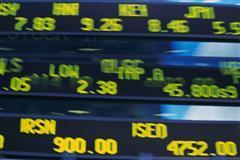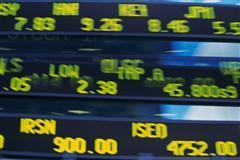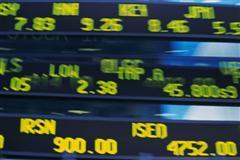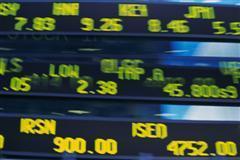| Home | About | Archives | RSS Feed |

@theMarket: Commodities and Emerging Markets
 It has been a given that where commodities go, so go emerging markets; however, that correlation seems to have broken down over the last few months. While commodities, both precious and base, have continued to rise, emerging markets have underperformed since November. What gives?
It has been a given that where commodities go, so go emerging markets; however, that correlation seems to have broken down over the last few months. While commodities, both precious and base, have continued to rise, emerging markets have underperformed since November. What gives?
For several years the basic investment thesis is that emerging markets are economic juggernauts with an insatiable demand for the world's natural resources. Their factories devour every form of commodity and transform them into the world’s textiles, steel, clothes, cars, toys, electronics and scores of other exports.
But sometimes you can come up against too much of a good thing. That is what is happening to several of the larger emerging market countries such as China, Brazil and India. All three countries managed to avoid global recession. While we languished with high unemployment and negative growth, most emerging markets continued to grow and grow and grow. As a result, their domestic economies are beginning to overheat.
As they do, their inflation rates are starting to rise to uncomfortable levels with serious consequences for their economic future. China, for example, grew 9.8 percent in the fourth quarter while registering a 4.6 percent inflation rate. This week, Brazil announced that consumer prices in there rose to nearly 6 percent.
The governments of these countries have responded by raising interest rates and tightening credit conditions. The Brazilian Central Bank hiked interest rates by one half percent to 11.25 percent on Thursday and observers expect another hike very soon.
Local investors, drunk on ever-higher stock prices in 2010, are decidedly miffed that their central banks are taking away the punch bowl this year. China's stock market has declined over 15 percent since November. Brazil and India have also underperformed the U.S. markets as well.
In the meantime, commodity prices have largely ignored this new reality until very recently. Brazil's sudden rate hike, in combination with China's higher reading on domestic inflation this week, have finally shaken some of the euphoria out of the commodity market. We need this pullback (and I hope it continues) in order to square prices with reality in the emerging markets
I believe the declines in emerging stock markets are coming to an end. I would be a buyer of those markets on further pullbacks, because I still believe that regardless of any further short-term actions to slow growth, their economies will still outgrow more developed markets this year, next year, and the years after that. Commodities are also a great place to invest once this pullback is over. I advise that you wait for some price stability before adding to positions.
As for the U.S. stock markets, it appears that just about everyone is now in the "too extended, probable sell-off" camp that we have been waiting for over the last few weeks. The contrarian in me doesn’t like to see the consensus come over to my point of view because the stock market often does what is most inconvenient to the greatest number of people.
Nonetheless, I would love to see a 3 to 5 percent correction before the end of the month. It would give me the opportunity to put more money to work. For specific recommendations, call or e-mail me.
Bill Schmick is an independent investor with Berkshire Money Management. (See "About" for more information.) None of the information presented in any of these articles is intended to be and should not be construed as an endorsement of BMM or a solicitation to become a client of BMM. The reader should not assume that any strategies, or specific investments discussed are employed, bought, sold or held by BMM. Direct your inquiries to Bill at 1-888-232-6072 (toll free) or e-mail him at wschmick@fairpoint.net. Visit www.afewdollarsmore.com for more of Bill's insights.
| Tags: commodities, emerging markets |
@theMarket: Commodities and Emerging Markets
 It has been a given that where commodities go, so goes emerging markets, however, that correlation seems to have broken down over the last few months. While commodities, both precious and base, have continued to rise, emerging markets have underperformed since November. What gives?
It has been a given that where commodities go, so goes emerging markets, however, that correlation seems to have broken down over the last few months. While commodities, both precious and base, have continued to rise, emerging markets have underperformed since November. What gives?
For several years the basic investment thesis is that emerging markets are economic juggernauts with an insatiable demand for the world's natural resources. Their factories devour every form of commodity and transform them into the world’s textiles, steel, clothes, cars, toys, electronics and scores of other exports.
But sometimes you can come up against too much of a good thing. That is what is happening to several of the larger emerging market countries such as China, Brazil and India. All three countries managed to avoid global recession. While we languished with high unemployment and negative growth, most emerging markets continued to grow and grow and grow. As a result, their domestic economies are beginning to overheat.
As they do, their inflation rates are starting to rise to uncomfortable levels with serious consequences for their economic future. China, for example, grew 9.8 percent in the fourth quarter while registering a 4.6 percent inflation rate. This week Brazil announced that consumer prices in their country rose to nearly 6 percent.
The governments of these countries have responded by raising interest rates and tightening credit conditions. The Brazilian Central Bank hiked interest rates by one half percent to 11.25 percent on Thursday and observers expect another hike very soon.
Local investors, drunk on ever-higher stock prices in 2010, are decidedly miffed that their central banks are taking away the punch bowl this year. China's stock market has declined over 15 percent since November. Brazil and India have also underperformed the U.S. markets as well.
In the meantime, commodity prices have largely ignored this new reality until very recently. Brazil's sudden rate hike, in combination with China's higher reading on domestic inflation this week, have finally shaken some of the euphoria out of the commodity market. We need this pullback (and I hope it continues) in order to square prices with reality in the emerging markets
I believe the declines in emerging stock markets are coming to an end. I would be a buyer of those markets on further pullbacks, because I still believe that regardless of any further short-term actions to slow growth, their economies will still outgrow more developed markets this year, next year, and the years after that. Commodities are also a great place to invest once this pullback is over. I advise that you wait for some price stability before adding to positions.
As for the U.S. stock markets, it appears that just about everyone is now in the "too extended, probable sell-off" camp that we have been waiting for over the last few weeks. The contrarian in me doesn't like to see the consensus come over to my point of view because the stock market often does what is most inconvenient to the greatest number of people.
Nonetheless, I would love to see a 3 to 5 percent correction before the end of the month. It would give me the opportunity to put more money to work. For specific recommendations, call or e-mail me.
Bill Schmick is an independent investor with Berkshire Money Management. (See "About" for more information.) None of the information presented in any of these articles is intended to be and should not be construed as an endorsement of BMM or a solicitation to become a client of BMM. The reader should not assume that any strategies, or specific investments discussed are employed, bought, sold or held by BMM. Direct your inquiries to Bill at 1-888-232-6072 (toll free) or e-mail him at wschmick@fairpoint.net. Visit www.afewdollarsmore.com for more of Bill's insights.
| Tags: commodities, emerging markets |
@theMarket: This Is the Year for Commodities
 Last year, precious metals garnered the headlines and the attention of most investors. Gains in gold, silver, palladium and platinum left stocks in the dust. This year may well be the year for base metals, food and energy to outshine precious metals and the stock market overall.
Last year, precious metals garnered the headlines and the attention of most investors. Gains in gold, silver, palladium and platinum left stocks in the dust. This year may well be the year for base metals, food and energy to outshine precious metals and the stock market overall.
While gold and even silver's rise last year was more about concerns over currencies and inflation, the rise in basic materials is largely a play on the coming global economic recovery. The investment theme is simple: while world economies are beginning to grow, nations and companies rev up production in order to meet demand and therefore the demand for commodities increase proportionately. At the same time, new wealthier, middle-class consumers in developing countries, such as China and India, demand a better diet and now have the money to afford such delicacies as beef, pork, chicken as well as different grains and even bread and pastries.
This scenario is neither new nor original. The prices of aluminum, cooper, steel, lead, zinc and a host of other hard metals as well as wood and paper and other basic materials have been on the rise over the last few years simply because certain developing nations such as China have been demanding more of these commodities to both re-build the infrastructure of their countries and also export to developed nations such as the U.S. and Europe. Now that global economic growth is at hand, demand for these materials will continue to expand, and at an accelerated rate.
Some of these commodities, like rare-earth metals for example, have recently skyrocketed in price causing a mini-bubble in that sector. We can expect more of the same.
Back in September of last year, readers may recall my column "Wheat, Weather and the Grocery Shelves" in which I warned that food prices were heading much higher.
"The real increases in food prices are still waiting in the wings until the world's economies are on firmer footing. Once people can afford to spend again, prices are expected to move up quickly in commodities across the board."
Well, folks, that time has come. Wall Street analysts forecast that food prices could rise anywhere from 2.5 to 4 percent this year versus 1.5 percent in 2010. A variety of factors including weather, population growth, the rise of the emerging market consumer as well as global economic growth have lit a fire under commodities as mundane as sugar, corn and cotton.
Since June, corn prices are up 94 percent, soybeans have gained 51 percent and wheat is up over 80 percent. Just this week, the U.S. Agricultural Department reduced its estimates for global harvests of some important crops, as well as increased their demand forecasts for commodities overall. It seems a safe bet that when looking for new investments this year, commodity-producing companies and countries should be high on your list.
As for the markets overall, all three averages are grinding higher as the second week of January comes to a close. I still expect a pullback of sorts (risk of 3-4 percent) but that would simply be another opportunity to buy stocks, given that I think the stock market will provide rewards of 15-20 percent between now and August. Given that kind of risk/reward scenario, I am a buyer of equities on every dip.
Bill Schmick is an independent investor with Berkshire Money Management. (See "About" for more information.) None of the information presented in any of these articles is intended to be and should not be construed as an endorsement of BMM or a solicitation to become a client of BMM. The reader should not assume that any strategies, or specific investments discussed are employed, bought, sold or held by BMM. Direct your inquiries to Bill at 1-888-232-6072 (toll free) or e-mail him at wschmick@fairpoint.net. Visit www.afewdollarsmore.com for more of Bill's insights.
| Tags: metals, commodities |
@theMarket: No Gain, No Pain
 Markets did little in the first week of the 2011. All three averages barely budged as investors waited for some new catalyst that might hint at the near-term direction of the market. Friday's disappointing unemployment data gave them that excuse.
Markets did little in the first week of the 2011. All three averages barely budged as investors waited for some new catalyst that might hint at the near-term direction of the market. Friday's disappointing unemployment data gave them that excuse.
Only 103,000 jobs were created in December while some economists were forecasting as many as 400,000 jobs for the month. I'm not concerned about the monthly unemployment data or about a possible pullback in the next few days or weeks. While the overall market has vacillated lately, the commodity sector has been undergoing a good old-fashioned correction. Given that commodity stocks have largely led the market higher for the last year, in my opinion, declines in that area are telegraphing a coming slide in the overall stock market.
A pullback, when stocks are overextended like they are at the moment, simply allows the overall market to prepare for further gains in the future. A 2 to 4 percent dip therefore, while painful in the short term, would be barely be a blip in the coming move higher.
For those who missed last week's column, my prediction for the S&P 500 Index for 2011 is north of 1,450-1,500. We could see gains of between 15 to 20 percent before we hit another roadblock. As a result, I would advise even the most conservative investor to take advantage of any dip to re-orient their portfolio toward equities in 2011.
Remember, however, that we are still in a secular bear market and will be for the foreseeable future. What we are experiencing (and have been since March 2009) is a rally (called a secular bull market) within this long-term downtrend. It is a period where a buy and hold strategy will only result in losses to your portfolio. We have had similar periods in stock market history, with the most recent occurring between the years of 1966 and 1982.
During that period there were several opportunities, lasting from several months to a few years, where great gains were made, with similar opportunities to lose a great deal of money.
Consider this a market of seasons where at times you plant seeds, watch your crops grow, and then harvest them before the winter arrives. Right now we're in planting season (buying stocks) because the climate (economic environment) is conducive to growth. The economy will surprise investors this year by growing a little more than we expect (possibly 3.5 percent). The Fed will continue to keep short-term rates low while supporting the stock market using this "easy money" strategy. At the same time, the Obama administration's wide range of tax cuts and benefit extensions as well as investment tax breaks for our corporations will further boost spending.
Down the road, there still are several clouds looming on the horizon that may at some point de-rail this happy scenario. Although the much-feared specter of hyperinflation is overblown, in my opinion, we could see a sharp spike in long-term interest rates later in the year. The financial problems of European banks also worry me, and their problems have not gone away.
"But everyone I talk to is bullish," protests one investor from Pittsfield, who worries that the consensus is usually wrong.
He is right that my forecasts are very much in line with The Street. Friday, for example, Goldman Sachs upgraded their S&P 500 forecast to 1,500. Sometimes, the consensus and the markets can be in sync. I believe that the economic evidence is so overwhelmingly positive that, barring a new major negative, the near-term future of the markets is fairly certain.
Even Fed Chairman Ben Bernanke in his discussion Friday with Senate Budget Committee commented that he sees "increased evidence that a self-sustaining recovery" is unfolding as well as a "moderately stronger" economy this year. I'll stick with the Fed and bet on the market.
Bill Schmick is an independent investor with Berkshire Money Management. (See "About" for more information.) None of the information presented in any of these articles is intended to be and should not be construed as an endorsement of BMM or a solicitation to become a client of BMM. The reader should not assume that any strategies, or specific investments discussed are employed, bought, sold or held by BMM. Direct your inquiries to Bill at 1-888-232-6072 (toll free) or e-mail him at wschmick@fairpoint.net. Visit www.afewdollarsmore.com for more of Bill's insights.
| Tags: bulls, recovery, interest rates |
@the Market: What Will the New Year Bring?
 |
Now that we have safely tucked away the year 2010 with the S&P 500 Index up 12.9 percent, will we enjoy a similar or better return in 2011? Clearly, the majority of investors are looking for another up year. I believe that’s a safe bet, at least for the first half of the year.
Since March of 2009, I have been forecasting an up market and have been correct in doing so. Sure, during that time period we have had our ups and downs largely based on worries of a "double dip" recession here in the U.S. and financial problems in Europe. I discounted both events but also warned investors that the markets would react negatively. I considered those sell offs a buying opportunity. In hindsight, where I have erred was in estimating the severity and duration of some of these pullbacks.
For example, I did identify an interim top in the markets back in April (at around the S&P 500 1,220) but was too bearish in estimating the index would decline to 950 before the correction would be over. Instead, the S&P 500 tested and re-tested the 1,035 level and then resumed its climb in September.
The low in the markets coincided with The Federal Reserve’s announcement that they planned to launch a second quantitative easing. It was enough to reverse my cautious stance, admit my mistake, and turn positive on the markets. I have been bullish since the fall and have no reason to change my mind now that we are entering the New Year.
I believe the economy will hold positive surprises for us in the first half of the year. Growth will exceed most economists’ forecasts and although unemployment will remain high, we will see a steady improvement over the next several months as American corporations hire more workers. The housing market will also surprise us as well. I firmly believe 2010 saw the bottom in housing prices and sales. In 2011, we should see a small but steady improvement in all but the most bombed-out housing markets. The Fed will stay accommodative as well keeping short-term rates low and equities higher.
All this good news should translate into higher prices in global stock markets and in commodities. The S&P 500 could see gains of 15 percent-plus before the year is over and depending upon your investments, that gain could be substantially higher. However, we will still be subjected to corrections. Right now, for example, as a result of this Christmas rally, all three indexes are over extended and in need of a pullback. This could occur as early as next week or later in the month. These mini-corrections are an inevitable cost of doing business in equity
There is also a distinct possibility that later in the year the stock market will get ahead of itself. After all, markets vacillate between fear and greed. As the averages trend higher, investors tend to believe markets will go higher still. Valuations get out of whack or events occur that change the game and the markets correct. So don’t be surprised if I sound a note of caution as early as this spring. Rest assured that somewhere out there lurks another substantial pullback (greater than 10 percent). Hopefully, I will be on the job and lucky enough to identify it when it occurs.
However, for now, I see clear sailing ahead with only a few minor squalls in the stock markets. As for fixed income, clearly, interest rates have seen their lows in the U.S. Treasury and Municipal bond markets. That multi-decade Bull Run is over and investors would be well advised to steer clear of those areas. Commodities will continue to gain although this year I suspect precious metals will take a back seat to their more mundane cousins such as agricultural products, base metals and materials.
All in all, I feel as positive about the markets now as I did at this time last year. I guess the difference today is that I am expecting more people to enjoy the benefits of an economic expansion than ever before. And that is a real reason to celebrate, so happy New Year to you and yours.
Bill Schmick is an independent investor with Berkshire Money Management. (See "About" for more information.) None of the information presented in any of these articles is intended to be and should not be construed as an endorsement of BMM or a solicitation to become a client of BMM. The reader should not assume that any strategies, or specific investments discussed are employed, bought, sold or held by BMM. Direct your inquiries to Bill at 1-888-232-6072 (toll free) or e-mail him at wschmick@fairpoint.net. Visit www.afewdollarsmore.com for more of Bill's insights.
| Tags: forecast |

